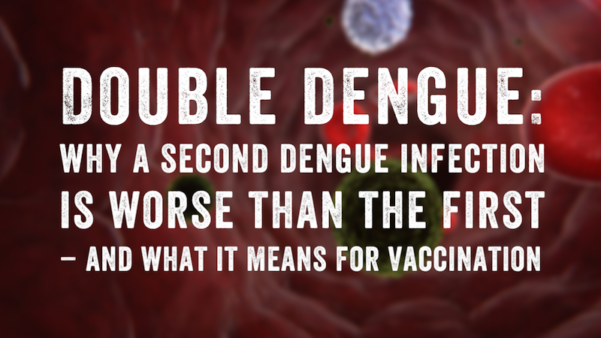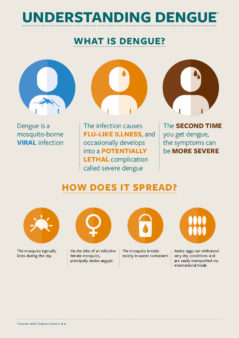- by Gary Finnegan
Double dengue: why a second dengue infection is worse than the first – and what it means for vaccination

The impact of a second dengue infection can be amplified due to antibodies produced to fight off an earlier infection. That’s why dengue vaccination may be best for those who have already recovered from the disease.
‘Antibody enhancement’ may sound like technical medical jargon but the immunological theory is having its day in the sun. It is the idea that explains why the first brush with a dengue virus is less serious than the second.
‘There are thousands of dengue cases across the world each year, making dengue viruses one of the most important mosquito-borne pathogens,’ explains Professor Pratit Samdani, a renowned dengue expert in Mumbai, India. ‘There are four types of dengue – known as DEN I, DEN II, DEN III and DEN IV – and while infection with one virus will make you seriously ill, the symptoms can become potentially fatal when infected subsequently with a different strain.’
The science behind this phenomenon is fascinating. It turns out that natural proteins called antibodies, produced by the body to fight infection, help defeat the first dengue virus but leave us susceptible if we are later hit with another dengue virus.
‘Whenever one gets an infection you get antibodies,’ says Prof Samdani. ‘In dengue, these antibodies let the second virus enter the cells easily, increasing the risk of dengue hemorrhagic fever! This is because of a phenomenon called antibody-dependent enhancement.’
This explanation is supported by most experts in the field, including Prof Tikki Pang at the University of Singapore’s Lee Kuan Yew School of Public Policy. ‘Instead of protecting the individual during a second dengue infection with a different dengue serotype, it enhances virus replication and causes more severe disease,’ he says.
Who should have the dengue vaccine?
The impact of second dengue infection has been in the news this month after Sanofi Pasteur, the company that developed the world’s first dengue vaccine, shared new data on the impact of prior dengue infection.
The company has found that the vaccine protects against disease in those who had been infected before vaccination. For those who have never been infected, vaccination may not be advisable as the body responds in the same way as it would to an initial infection. Thus, a second dengue infection could be more severe.
‘Ideally, people should do a diagnostic test first to determine if they have ever been exposed to dengue, but this is not always possible,’ says Prof Pang. ‘Instead, a good knowledge of a previous history of dengue infection and physicians’ acumen and experience are important.’
While most people in endemic areas have been infected by the time they reach adolescence, many cases are mild or ‘silent’ – which serious or lasting symptoms.

‘In endemic areas, people who have never been infected by dengue are in the minority – in most endemic countries 90% are infected by the time they reach adolescence, without necessarily becoming ill,’ says Prof Pang. ‘The vaccine is still very safe and not all of those who are facing the risk of a second infection, develop a severe form of the disease. Actually, the vast majority don’t.’
Better diagnostics and surveillance needed
The new data on how best to use the vaccine has caused confusion in some quarters. In the Philippines, for example, a pioneering immunization campaign has been put on hold and a political row is brewing.
ADVA – the Asian Dengue Vaccine Advocacy group – released a statement explaining the science and calling for calm. ‘This outcome should not cause undue panic among individuals who have already received the dengue vaccine,’ it said. ‘Seropositive individuals would benefit from receiving the vaccine.’
The group said serological pretesting would help doctors to determine whether patients were suitable candidates for the vaccine, adding that an ‘appropriate, cheap’ test should be made universally available.
The furor over the dengue vaccine has sparked concerns that vaccine uptake and development might be harmed by negative headlines.
‘Once you cut through the noise, what is most apparent is that the global dengue community – particularly in areas of high endemicity – urgently need better dengue diagnostics and disease surveillance reporting,’ said Kamran Rafiq, International Society for Neglected Tropical Diseases.
‘This news could potentially mean delays in the global vaccine development pipeline by forcing longer waits for safety issues to be cleared, underlining the pressing need to differentiate between seropositive and seronegative patients.’
—

